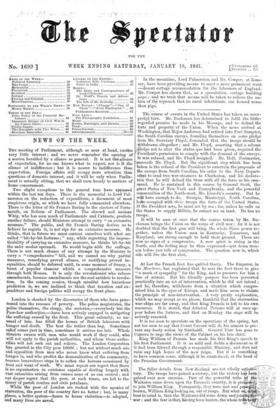NEWS OF THE WEEK.
THE meeting of Parliament, although so• near at hand, excites Very little interest ; and we never remember the opening of session heralded by a silence so general. It is not theasilence of expectation for no one knows what to expect, nor isit the silence of indifference ; but it is nearer to indifference than expectation. Foreign affairs still occupy more attention than questions of domestic interest, and it will be only when Parlia- ment is actually sitting, that we shall turn keenly to matters of home concernment.
- Two slight exceptions to the general tone have appeared within the last ten days. There is the memorial to Lord' Pal- merston on the reduction of expenditure, a document of most suspicious origin, on which we have fully commented elsewhere. ' There is the letter of Sir Francis Baring to the electors of Ports- Mouth, on Reform of Parliament. The shrewd and ancient Whig, who has seen much of Parliaments and Cabinets, predicts another failure, should Ministers attempt to carry "an extensive measure." The public, and Sir Francis Baring desires us to believe he regrets it, is not ripe for an extensive measure. He thinks, that in future we must content ourselves with what are called "bit-by-bit Reforms ; " nay, while regretting the imprac- ticability of carrying an extensive measure, he thinks bit-by-bit the safer modus operandi. He would begin with the suffrage. There is not much chance of any attempt by the Ministry to carry a "comprehensive" bill, and we cannot see why partial measures, remedying proved abuses, or rectifying proved in- equalities, should be deferred until, in some moment of frenzy, a burst of popular clamour whirls a comprehensive measure through both Houses. It is only the revolutionist who refuses amendments, because amendments are the real antidote to revolu- tion. In the coming session though mindful how hazardous prediction is, we are incline to think that taxation and ex- penditure and foreign politics will occupy the front place.


























